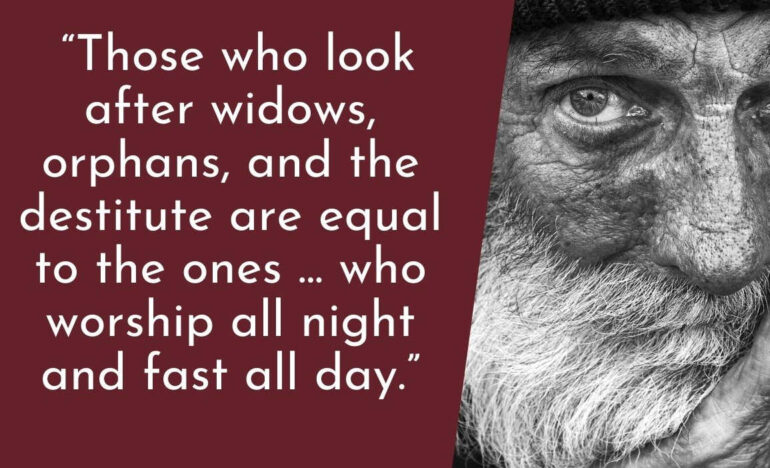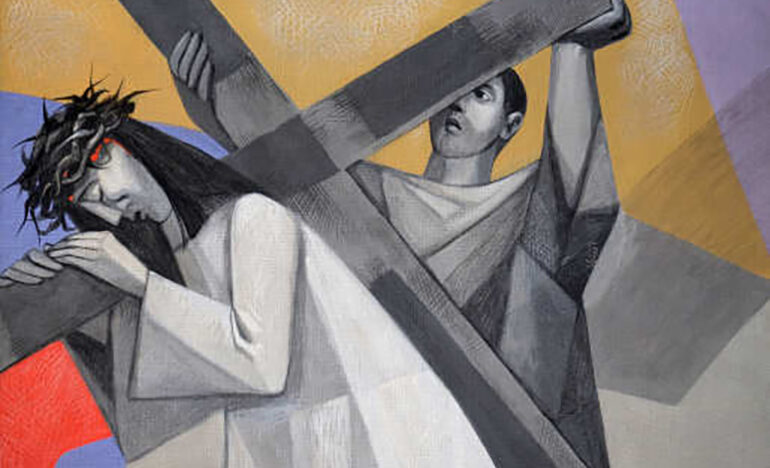Islam’s Third Pillar: Almsgiving and Concern for Those in Need

By Kathy Keary
Part 17. The full series is here: The Contemplative Spirit of Islam.
A common thread that runs through the many faith traditions of the world is that our relationship with God is lacking if we are not giving of ourselves to others. An authentic spirituality expresses itself in service and almsgiving. In her book, God of Love: A Guide to the Heart of Judaism, Christianity, and Islam, Mirabai Starr asserts:
The universal mandate is to disarm our hearts and stretch beyond our comfort zone to respond with love to the cries of the world … Let us embrace our wounds as evidence of our membership in the human family and allow them to guide us into treating all beings as our mothers and sons, our brothers, and grandmothers, doing everything in our power to lift their burdens and bring them solace.
This theme is true for Muslims as well. The third pillar of Islam is almsgiving and concern for those in need. Rumi’s teacher, Shamsi Tabriz, emphasized that serving our fellow beings is at the heart of worshipping God. The Qur’ān instructs: “Give freely of what you love” (Sūrah ĀI ‘Imrān 3:92). The Prophet Muhammad emphasized the weight of this foundational pillar of Islam: “Those who look after widows, orphans, and the destitute are equal to the ones striving in the way of Allāh, and in my eyes, the same as those who worship all night and fast all day.”
Note: Never miss an article published on the Renewal Center website: Sign up to receive our newsletters.
Eighty verses in the Qur’ān address the practice of almsgiving which has two forms: zakāt and sadaqāt. Zakāt is translated as “cleansing” and deals with purification. To purify themselves and their belongings, Muslims are asked to yearly donate 2.5% of their net worth to those in need.
Sadaqāt means donation and requires that the almsgiving must be money that was honestly acquired and discreetly given. The Qur’ān instructs that charity given to the needy in secret will atone for some of an individual’s sins (Fragrance, 128).
Jamal Rahman emphasizes that serving is one of the reasons of our very existence. We each have a unique gift to offer to build up our world and serve the common good. He elaborates:
Our unique mission in life unfolds with beauty and fluidity when we serve in the here and now, in the hundred-and-one opportunities that come our way each day. In becoming a servant of service at every moment, our sacred mission unfolds, and we become a master of life (Fragrance, 131).
God’s words communicated to Muhammad usually in a dream are known as hadith qudsi. Speaking to the prophet in this manner, God’s words are similar to those that appear in the Christian text, the Gospel of Matthew, chapter 25 when Jesus said, “Whatever you did for one of these least brothers (or sisters) of mine, you did for me.” In the hadith gudsi, God asks: “Child of Adam, why did you not visit me when I was unwell and in need of food and drink?” Dumbfounded, the person he was speaking to inquired: “But you are the Lord of the Worlds. What could you possibly need from me?” God responded, “When one of my servants is ill, you will find me with him. When you offer him food and drink, you are offering them to me” (Out of Darkness, 214, 215).
The pursuit of social justice, esteemed in many faiths, finds prominence in Islam as well. In the words of Rahman:
As servants of our Merciful God, we are obliged to work for structural and systemic changes within our own communities in order to free our fellow humans from the bondage of poverty and oppression. Our responsibility as viceroys of the Divine is to use our God-given eyes to witness the pain in the world and our God-given tongues to speak out against injustice wherever we see it (Out of Darkness, 216).
Each of us has a unique calling. Every event, circumstance, and relationship in our lives has prepared us for fulfilling our personal mission. Sages instruct that if we deepen our desire to serve, service opportunities will be placed before us. If we foster a sincere attitude of service in our daily lives focusing more on sharing than accumulating and more on collaboration than competition, our unique purpose will surface (Out of Darkness, 218).
We refer you to our article, “Out of Contemplation Grows Action,” which speaks of service as an offshoot of contemplation in the Christian tradition. This same call to action can be found in all of the major faith traditions speaking volumes about the divine mandate summoning each of us to be a light for others. God has raised up many prophets over the centuries to preach the sermon of service and almsgiving. The wise will pay heed.
Stay tuned for next week when we will explore the fourth pillar of Islam: self-purification through fasting in the month of Ramadan as well as the fifth pillar, the pilgrimage to Mecca.
Reference
Rahman, Jamal; Elias, Kathleen Schmitt; and Redding, Ann Holmes. Out of Darkness Into Light: Spiritual Guidance in the Quran with Reflections from Christian and Jewish Sources. Harrisburg, New York: Morehouse Publishing, 2009.
Rahman, Jamal. The Fragrance of Faith: The Enlightened Heart of Islam. Bath, England: The Book Foundation, 2004.
Starr, Mirabai. God of Love: A Guide to the Heart of Judaism, Christianity, and Islam. Rhinebeck, NY: Monkfish Publishing Company, 2012.
[Kathy Keary, a Precious Blood Companion and spiritual director, holds a master’s degree in theological studies and is a graduate of the Atchison Benedictine’s Sophia Center’s Souljourners Program, an intense study of spirituality and spiritual direction. Kathy believes that the divine is present and active in all of life and encourages others to be awakened to the God in all including the divine within. She enjoys accompanying others on their journey to wholeness discovering the person they were created to be.]
We’d Like to Hear from You!
We’d like to know what you think about this article. Send us a comment using the form below. Do you have a suggestion? Is there something you want to learn more about? Send us a note.
Related

What’s the Problem?
By Fr. Garry Richmeier, C.PP.S.
You can’t fix a relationship or a behavior like a mechanic fixes a car or a surgeon “fixes” a patient. Behaviors and relationships don’t have parts that can be fixed or replaced when the break or malfunction.

Lent Video Five – Meditation: “Only a Shadow of You Love”
Next Sunday is Palm Sunday and next week is Holy Week. In anticipation of those solemn commemorations, today, Fr. Ron will help us pray and meditate on the Stations of the Cross.
Categories
Assembling God's Puzzle Coffee with Padre Cooking & Spirituality Encounters of the 4th Kind Family Matters Reflections on the Eucharsitic Prayers Spiritual Resources Taize Prayers The Contemplative Life Traveling with Pilgrims of Hope Uncategorized Videos Week of Prayer for Uhristian Unity When you need a little help
